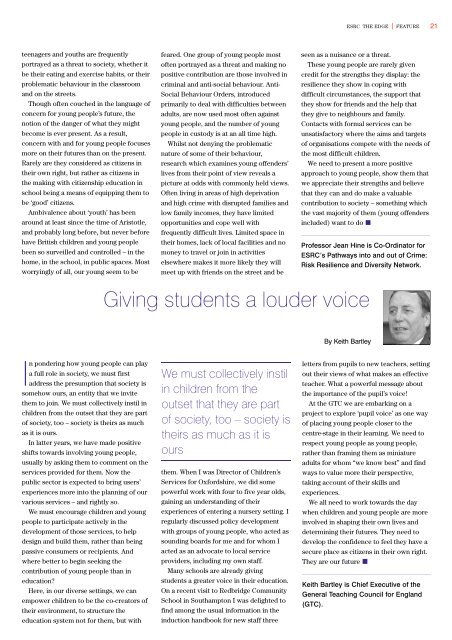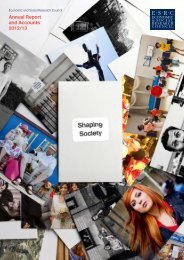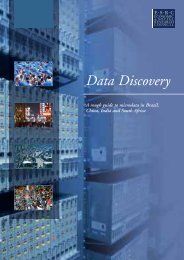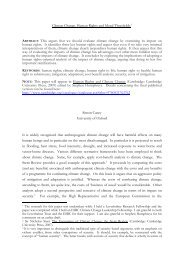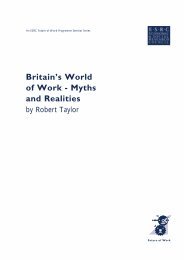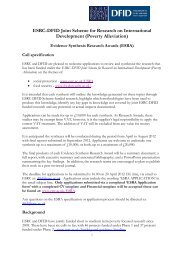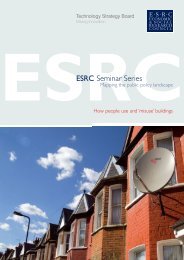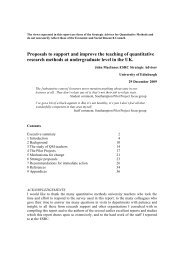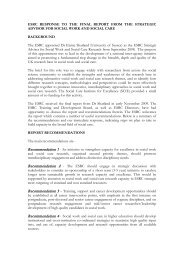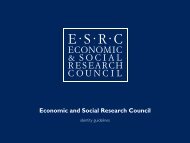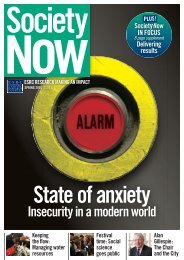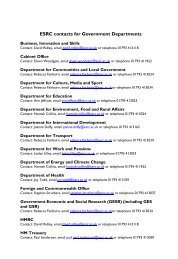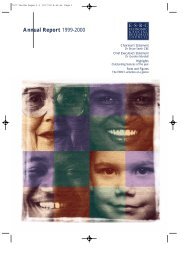Issue 26 - November 2007 (PDF, 1.69Mb) - ESRC
Issue 26 - November 2007 (PDF, 1.69Mb) - ESRC
Issue 26 - November 2007 (PDF, 1.69Mb) - ESRC
Create successful ePaper yourself
Turn your PDF publications into a flip-book with our unique Google optimized e-Paper software.
teenagers and youths are frequently<br />
portrayed as a threat to society, whether it<br />
be their eating and exercise habits, or their<br />
problematic behaviour in the classroom<br />
and on the streets.<br />
Though often couched in the language of<br />
concern for young people’s future, the<br />
notion of the danger of what they might<br />
become is ever present. As a result,<br />
concern with and for young people focuses<br />
more on their futures than on the present.<br />
Rarely are they considered as citizens in<br />
their own right, but rather as citizens in<br />
the making with citizenship education in<br />
school being a means of equipping them to<br />
be ‘good’ citizens.<br />
Ambivalence about ‘youth’ has been<br />
around at least since the time of Aristotle,<br />
and probably long before, but never before<br />
have British children and young people<br />
been so surveilled and controlled – in the<br />
home, in the school, in public spaces. Most<br />
worryingly of all, our young seem to be<br />
In pondering how young people can play<br />
a full role in society, we must first<br />
address the presumption that society is<br />
somehow ours, an entity that we invite<br />
them to join. We must collectively instil in<br />
children from the outset that they are part<br />
of society, too – society is theirs as much<br />
as it is ours.<br />
In latter years, we have made positive<br />
shifts towards involving young people,<br />
usually by asking them to comment on the<br />
services provided for them. Now the<br />
public sector is expected to bring users’<br />
experiences more into the planning of our<br />
various services – and rightly so.<br />
We must encourage children and young<br />
people to participate actively in the<br />
development of those services, to help<br />
design and build them, rather than being<br />
passive consumers or recipients. And<br />
where better to begin seeking the<br />
contribution of young people than in<br />
education?<br />
Here, in our diverse settings, we can<br />
empower children to be the co-creators of<br />
their environment, to structure the<br />
education system not for them, but with<br />
feared. One group of young people most<br />
often portrayed as a threat and making no<br />
positive contribution are those involved in<br />
criminal and anti-social behaviour. Anti-<br />
Social Behaviour Orders, introduced<br />
primarily to deal with difficulties between<br />
adults, are now used most often against<br />
young people, and the number of young<br />
people in custody is at an all time high.<br />
Whilst not denying the problematic<br />
nature of some of their behaviour,<br />
research which examines young offenders’<br />
lives from their point of view reveals a<br />
picture at odds with commonly held views.<br />
Often living in areas of high deprivation<br />
and high crime with disrupted families and<br />
low family incomes, they have limited<br />
opportunities and cope well with<br />
frequently difficult lives. Limited space in<br />
their homes, lack of local facilities and no<br />
money to travel or join in activities<br />
elsewhere makes it more likely they will<br />
meet up with friends on the street and be<br />
Giving students a louder voice<br />
We must collectively instil<br />
in children from the<br />
outset that they are part<br />
of society, too – society is<br />
theirs as much as it is<br />
ours<br />
them. When I was Director of Children’s<br />
Services for Oxfordshire, we did some<br />
powerful work with four to five year olds,<br />
gaining an understanding of their<br />
experiences of entering a nursery setting. I<br />
regularly discussed policy development<br />
with groups of young people, who acted as<br />
sounding boards for me and for whom I<br />
acted as an advocate to local service<br />
providers, including my own staff.<br />
Many schools are already giving<br />
students a greater voice in their education.<br />
On a recent visit to Redbridge Community<br />
School in Southampton I was delighted to<br />
find among the usual information in the<br />
induction handbook for new staff three<br />
E S R C T H E E D G E | F E AT U R E 21<br />
seen as a nuisance or a threat.<br />
These young people are rarely given<br />
credit for the strengths they display: the<br />
resilience they show in coping with<br />
difficult circumstances, the support that<br />
they show for friends and the help that<br />
they give to neighbours and family.<br />
Contacts with formal services can be<br />
unsatisfactory where the aims and targets<br />
of organisations compete with the needs of<br />
the most difficult children.<br />
We need to present a more positive<br />
approach to young people, show them that<br />
we appreciate their strengths and believe<br />
that they can and do make a valuable<br />
contribution to society – something which<br />
the vast majority of them (young offenders<br />
included) want to do<br />
Professor Jean Hine is Co-Ordinator for<br />
<strong>ESRC</strong>’s Pathways into and out of Crime:<br />
Risk Resilience and Diversity Network.<br />
By Keith Bartley<br />
letters from pupils to new teachers, setting<br />
out their views of what makes an effective<br />
teacher. What a powerful message about<br />
the importance of the pupil’s voice!<br />
At the GTC we are embarking on a<br />
project to explore ‘pupil voice’ as one way<br />
of placing young people closer to the<br />
centre-stage in their learning. We need to<br />
respect young people as young people,<br />
rather than framing them as miniature<br />
adults for whom “we know best” and find<br />
ways to value more their perspective,<br />
taking account of their skills and<br />
experiences.<br />
We all need to work towards the day<br />
when children and young people are more<br />
involved in shaping their own lives and<br />
determining their futures. They need to<br />
develop the confidence to feel they have a<br />
secure place as citizens in their own right.<br />
They are our future<br />
Keith Bartley is Chief Executive of the<br />
General Teaching Council for England<br />
(GTC).


